
To learn more check out our
Editorial Guidelines.
13 min read
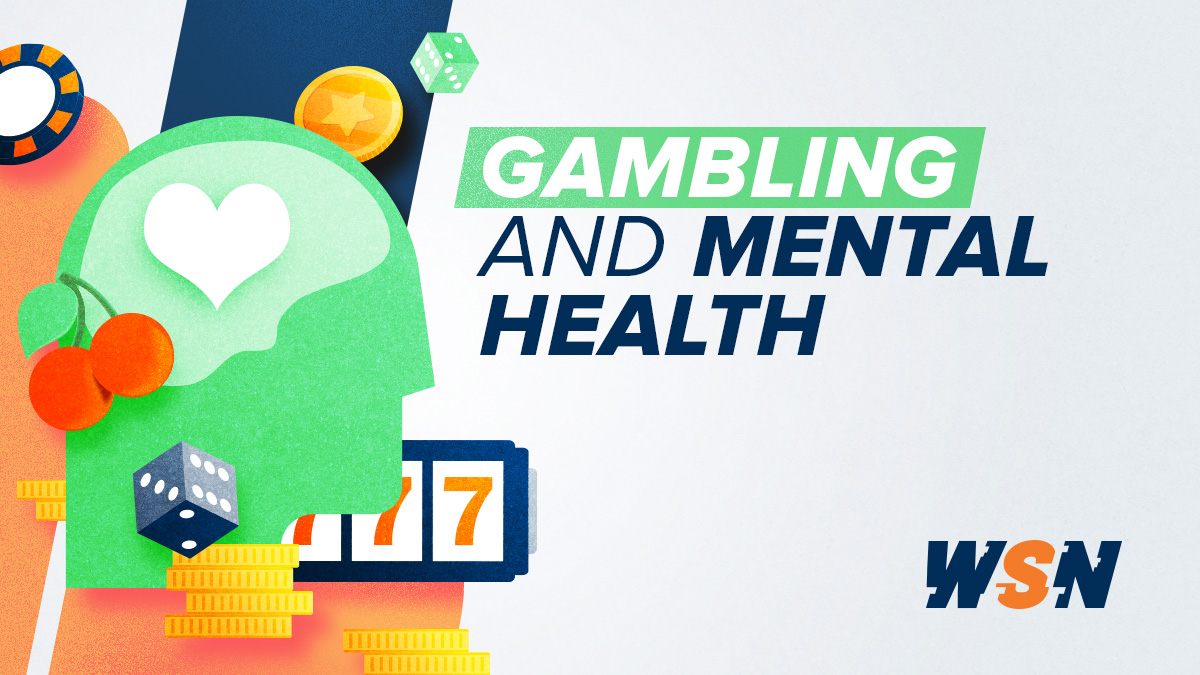
When practiced responsibly and in moderation, recreational gambling can be a fun part of a balanced life. However, it can also have powerful effects on your emotions, and when it turns into problem gambling, and can negatively affect many parts of your life - including your mental health.
On this page, we’ll delve into the relationship between gambling and mental health, how it works from the medical and scientific perspective, why people gamble, and how you can help yourself and others improve their mental health.
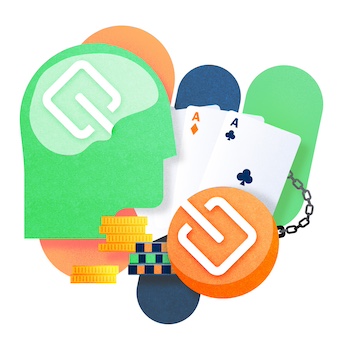 How Mental Health and Problem Gambling Are Connected
How Mental Health and Problem Gambling Are ConnectedAnyone who has ever experienced the rush of a big gambling win knows that it can have a profound effect on your emotions and mental state. Like many powerful emotional experiences, this effect should be enjoyed in moderation. When experienced every now and again, it can be a fun and positive thing, but when you start pursuing that feeling at all costs, you have a problem.
Gambling to chase the adrenaline rush or as a shortcut to escape from stress leads to negative mental health patterns. The feelings of pleasure you experience are dimmed, and you get stuck in a damaging rewards cycle with diminishing returns. If you use gambling compulsively, it can become an addiction.
Gambling is also intimately related to your personal finances, which is another area of your life that has a massive impact on your mental health. Using your money recklessly to gamble creates both excitement and anxiety. If you find yourself betting more than you can lose, accumulating debts, or borrowing money, this can bring stress and low self-esteem, and cause bigger problems to your mental health.
Even simple things like staying up late to gamble, whether online or at the casino, affect your mental health and overall well-being.
If you or someone you know is struggling with gambling, there is a chance that it could be due to having a behavioral disorder. A gambling disorder is variously known as compulsive gambling, problem gambling, or gambling addiction. If unchecked, it can greatly impact your personal and family life, work, and finances. And, of course, your mental health,
Someone who has a gambling disorder is stuck in a repeated pattern where they feel like they have lost control, will continue to gamble despite negative impacts on their life, or see gambling as more important to them than anything else.
Dr. Robert Custer is widely recognized as a pioneer in helping compulsive and problem gamblers. As problem gambling spiraled in the 1970s, he realized that it needed to be regarded as a disease that should be treated.
Dr. Cluster differentiated between recreational gamblers who could enjoy gambling socially with little to no negative consequences, and compulsive gamblers. In fact, he put himself in the former category.
He believed that compulsive gamblers were gambling as a way to escape pain, to compensate for some other unresolved issues in their life. He identified other characteristics too, like the tendency to bet alone. He founded a psychiatric center at Taylor Manor in Maryland, where he began to treat compulsive gamblers to try to identify the root cause of their issues.
Due largely to the efforts of Dr. Robert Custer, Pathological Gambling was added to the Diagnostic and Statistical Manual of Mental Disorders (DSM) in 1980. It was the first non-substance-related addiction recognized in the DSM. The diagnosis was based on Custer’s clinical experience and from the treatment of other professionals.
In the next edition, DSM-IV, the criteria for pathological gambling was revised to reflect its similarity to substance dependence with the addition of “repeated unsuccessful attempts to control, cut back, or stop gambling.”
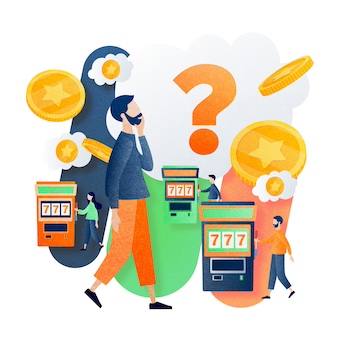 Why Do People Gamble?
Why Do People Gamble?For lots of people, gambling is a fun hobby that fits into their balanced lifestyle. For many others, it can be problematic. Whether harmful or an enjoyable activity, experts have identified four main reasons why people gamble:
Social reasons: Gambling, especially a night out at the casino, is inherently social. It’s an excuse to meet friends, get dressed up, and have some fun. Even with online gambling, which is naturally more isolated, communities and relationships can spring up online as people share tips and stories in forums and play together virtually.
Entertainment reasons: Gambling is fun. Lots of types of gambling (like poker or sports betting) require skills that can be honed over time. As you improve (and when you win), you get a rush and personal satisfaction. In moderation, all of this can be a positive thing. But overindulgence can lead to problem gambling.
Financial reasons: Winning money is an attractive proposition for everyone and is clearly a big part of why people gamble. However, seeing gambling purely as a way to make money is a terrible idea and a fallacy. Ultimately, organized gambling is set up so that the house or the casino always wins in the long run, and regular bettors are at a mathematical disadvantage. Gambling is a form of entertainment, it’s not a way to make money.
Coping reasons: Problem gamblers can come to turn to gambling when they feel stressed or depressed, to try to forget their worries and find some relief. Again, this is a fallacy. The positive emotions you can experience with gambling are finite and not a way to deal with anxiety or depression.
Everyone who gambles is different. While plenty of people can enjoy recreational gambling for what it is, others can slide into dangerous patterns and behaviors. Gambling has been described as a continuum, meaning that small changes and patterns accumulate and become more pronounced over time.
All gamblers fall into three main categories, which help us to understand if and when people might be at risk of developing a problem:
Low-risk Gambler: This person gambles occasionally, mainly for entertainment, hoping to win but expecting to lose.
At-risk Gambler: Someone who experiences guilt, tries to chase losses, or bets more than they can afford to lose.
High-risk Gambler: Struggles to control their gambling, negative impacts on finances, relationships, mental health, or all of the above.

Expert Opinion - Women and Problem Gambling
While problem gambling affects individuals of all genders, research suggests that there are gender disparities in the prevalence, presentation, and consequences of gambling disorders. Historically, gambling has been perceived as a predominantly male activity, leading to the underrepresentation of women in gambling research and treatment programs.
However, recent studies have shown that women are increasingly participating in gambling activities, with some evidence suggesting higher rates of gambling disorder among certain female populations. Moreover, women may experience unique risk factors for problem gambling, such as coping with stressors related to caregiving responsibilities or seeking social connections in gambling environments. Addressing gender-specific factors is essential for designing inclusive prevention and treatment strategies that effectively support individuals of all genders affected by gambling-related harms.
- Daniel Umfleet
Founder & CEO at Kindbridge
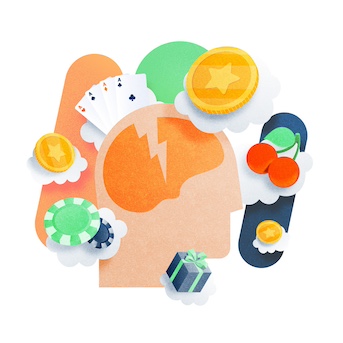 How Do People Develop Gambling Disorders?
How Do People Develop Gambling Disorders?Gambling disorders and addiction come into the picture when negative habits are repeated and responsible gambling practices are not being followed.
From a chemical perspective, the allure of gambling, and especially games such as slots, lies in its ability to hack the brain’s rewards system, which we’re going to get into in the next section.
There are lots of other factors that contribute to problem gambling too. The Conceptual Framework of Harmful Gambling has identified eight separate areas that can affect problem gamblers:
Gambling Environment
Gambling Types
Gambling Exposure
Gambling Resources
Cultural
Psychological
Social
Biological
All of these factors interact with your gambling habits and impact your mental health in different ways.
Dopamine is a chemical messenger in the brain. It fulfills many roles, one of which is to act as a kind of “reward center”. When it gets released, we feel excitement and pleasure. It affects our mood, motivation, happiness, and overall well-being.
Along with triggering dopamine, problem gambling goes hand in hand with other things that give your brain signals, like alcohol, money problems, or how you relate to other people. All of these things affect your brain’s reward system.
The concept of an intermittent reward schedule refers to the way your brain delivers rewards randomly, or at irregular intervals. As a type of “reward”, you might expect that your brain only releases dopamine when you win while gambling. In fact, it releases the chemical both when you win and lose, confusing the reward system
Each time your brain releases dopamine, you feel good. This makes you want to have the same experience again. However, due to the irregularity of the dopamine release, you can’t predict when your reward will arrive.
It means problem gamblers are constantly chasing a feeling but they don’t know if and when it will arrive, leading to erratic behavior and addiction.

Expert Opinion - Neurology and Gambling Addiction
Recent research in neuroscience has shed light on the neurobiological mechanisms underlying gambling addiction. Studies have shown that prolonged gambling activates the brain's reward system, primarily involving the release of dopamine, a neurotransmitter associated with pleasure and reinforcement. Over time, individuals with gambling disorders may develop neuroadaptations in their reward circuitry, leading to heightened craving and diminished impulse control.
Additionally, neuroimaging studies have identified differences in brain structure and function among problem gamblers, highlighting the complex interplay between genetics, environment, and neurobiology in the development of addictive behaviors. Understanding these underlying neural processes is critical for developing targeted pharmacological and behavioral interventions for gambling addiction.
- Daniel Umfleet
Founder & CEO at Kindbridge
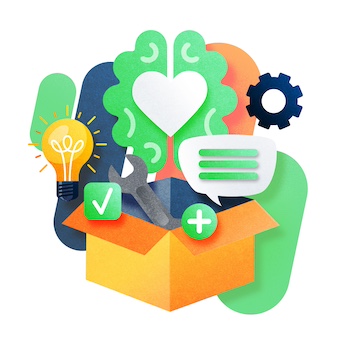 Tips and Resources for Positive Mental Health
Tips and Resources for Positive Mental HealthOnce you’ve realized that you have a gambling problem, or even that you simply want to alter or improve your relationship with gambling, you’ve already taken an important step on the road to recovery. Being mindful of your mental health and taking positive steps to protect it is going to be a big part of your journey.
Here are some tips and resources that you can use to promote positive mental health, whether you’re a casual gambler or you feel like you’re struggling:
When you’ve got a gambling problem, it is essential to talk about it. Talking can provide vital encouragement and accountability, whether with a friend, family member, counselor, or support group. Hearing other perspectives can change your views, and even just verbalizing what you are experiencing and hearing it out loud can help.
Sharing your experience helps solidify your commitment to change and reminds you that others have faced struggles too.
Once you’ve started this discussion, you must be honest and open about the struggles. It is also important to understand and focus on how gambling is changing your life and understand how you want to change. All of this promotes balanced and positive mental health.
One of the golden rules of responsible gambling is to only gamble with money you would be happy to lose. When you don’t, it can cause a lot of mental stress.
Setting and following a clear budget and spending plan is a vital step for anyone who has trouble managing their finances. Online casinos and sportsbooks often have tools to help with this, including deposit or betting limits.
It’s important not to chase lost money, whether you’ve got a gambling problem or not – it can quickly snowball into bigger losses and cause you to lose track of your spending and budgeting. Instead, accept them as sunk costs and focus on protecting your finances.
If your willpower is an issue, you should leave credit and debit cards at home when you go to a casino or set strict cash withdrawal limits.
As an additional precaution, if you have a serious gambling problem it could be necessary to inform your bank and credit card company about the issue to restrict your funds, or block payments to gambling sites.
Once you’ve realized you’ve got a gambling problem, minimizing exposure to potential temptations is crucial.
Block gambling websites on your browser, avoid casinos and gambling venues and distance yourself from individuals or activities associated with your gambling habit. You can also voluntarily limit or ban yourself from entering online or in brick-and-mortar casinos, thanks to self-exclusion schemes.
Just being in the environment - in-person or virtually - can be enough to trigger both anxiety and temptation. Extracting yourself from triggering situations gives you the best chance of improving your mental state.
In addition to blocking yourself from gambling venues and online sites, it is also beneficial to use apps like Bettor Time and other tools to track your recovery journey or your progress and provide additional support. Accountability and mindfulness around triggers is key.
Once you’ve put limits on your gambling or quit, it is important to fill this gap so you don’t instantly return to gambling. Filling the void left by gambling means new healthy habits and hobbies.
Explore new hobbies, reconnect with loved ones, or engage in activities you enjoy. Finding fulfilling alternatives can distract from urges and strengthen your resolve from gambling. You can use your newfound time to learn new skills or put more time into your work.
Choose hobbies and activities that are connected with positive mental health. Exercise and being out in nature have both been shown to improve your mood and counteract anxiety. Sociability and sharing healthy experiences with others is also important.

Expert Opinion - Problem Gambling and Older People
As the population ages, there is growing concern about gambling-related issues among older adults. While older adults may engage in gambling for leisure and socialization, they are also at increased risk for developing gambling problems due to factors such as retirement, social isolation, and age-related cognitive decline. Furthermore, older adults may be more vulnerable to financial losses associated with gambling, potentially impacting their retirement savings and financial security.
Recognizing the unique needs and challenges faced by older gamblers is critical for developing targeted prevention and intervention strategies tailored to this demographic. Providing education, outreach, and support services specifically designed for older adults can help mitigate the negative consequences of gambling and promote healthy aging outcomes.
- Daniel Umfleet
Founder & CEO at Kindbridge
https://campuspress.yale.edu/ledger/the-psychology-of-gambling/
https://nyproblemgambling.org/resources/what-is-problem-gambling/
https://www.responsiblegambling.org/for-the-public/about-gambling/the-science-behind-gambling/
https://www.helpguide.org/articles/addictions/gambling-addiction-and-problem-gambling.htm
Responsible Gambling Center: Helping You Gamble Safely
1 year ago | Pat Eichner/fit-in/400x235/1713863942/feature-responsible-gambling-tools.jpg)
Responsible Gambling Tools and Resources
1 year ago | Pat Eichner/fit-in/400x235/1713865152/feature-guide-to-resp-gambling-in-marketing.jpg)
Guide to Responsible Gambling in Marketing
1 year ago | Pat Eichner
We support responsible gambling. Gambling can be addictive, please play responsibly. If you need help, call
1-800-Gambler.
WSN.com is managed by Gentoo Media. Unless declared otherwise, all of the visible content on this site, such
as texts and images, including the brand name and logo, belongs to Innovation Labs Limited (a Gentoo Media
company) - Company Registration Number C44130, VAT ID: MT18874732, @GIG Beach Triq id-Dragunara, St.
Julians, STJ3148, Malta.
Advertising Disclosure: WSN.com contains links to partner websites. When a visitor to our website clicks on
one of these links and makes a purchase at a partner site, World Sports Network is paid a commission.
Copyright © 2025